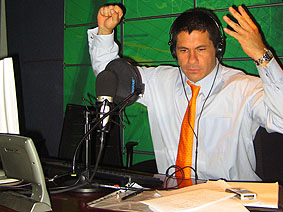
|
 |
 |
 Business News | May 2008 Business News | May 2008  
In Mexico, Getting on Radio Show Can Get You Out of Debt
 Sergio Solache - The Arizona Republic Sergio Solache - The Arizona Republic
go to original


| | Host David Paramo listens to a caller during his radio show "Don't Throw Away Your Money" in Mexico City. The show has been a hit in Mexico, which is quickly getting addicted to easy credit. (Sergio Solache/The Arizona Republic) | | |
Mexico City - The voice on the line was desperate.

Luz Maria Vega was drowning in debt. The bank was raising her credit-card rate. Her only hope: David Páramo, radio host and the wheeling-dealing savior of Mexico's growing hordes of credit-card addicts.

Páramo doesn't just dole out advice on his radio show, Don't Throw Away Your Money. He calls up banks, puts their executives on the spot and works out payment plans right on the air. Only two months after it debuted, the show has won a devoted following in a country that is just becoming accustomed to credit again after a 1994 financial collapse.

"The truth is, I owe a lot," said Vega, the caller on a recent show. "100,000 pesos ($9,500). If they don't respect the interest rate or make a special plan for me, I'm not going to be able to pay."

Páramo tried to calm her down as an assistant quickly dialed up Vega's bank, BBVA-Bancomer.

"I promise you we will find a way to turn this problem into a solution," Páramo said. "Isn't that right, Armando Reyna, customer-service supervisor for BBVA-Bancomer?"

The line crackled. Thousands of Mexico City residents were listening.

"Let's talk, and we'll arrange something," Reyna said.

From 5 to 6 p.m. weekdays, Páramo, a financial columnist for a newspaper by day, presides over these negotiations from a darkened studio in central Mexico City, waving his arms, joking with guests and showering creditors and debtors with a non-stop stream of suggestions and comforting words.

His switchboard at Reporte 98.5 FM is always swamped with calls, and messages pleading for help pour into the studio's computer at the rate of more than one a minute.

"The Mexican financial system has grown exponentially in the last few years," Páramo said. "The access that Mexicans have to more and more (credit) is incredible, but most people don't know how to use credit."

After Mexico's 1994 financial crash, when the peso lost nearly half of its value, most banks stopped lending money in Mexico. Then came a costly bank bailout that undermined many Mexicans' faith in the financial system.

But since 2000, the Mexican economy has been mostly stable and lenders are trolling for customers again.

The number of credit cards in circulation soared from 7.8 million in 2002 to 24 million last year. Some people have two or three cards. Some of Páramo's callers have debts that run as high as $80,000. The number of mortgages approved went from 705,000 to 1.2 million in the same period. Car sales have risen to more than 1 million a year.

Still, interest rates remain high compared with the United States. Annual percentage rates on Mexican credit cards range from 29.5 percent to 113 percent, and customers can easily get in over their heads.

"It's a problem for people," Páramo said. "When you go into a bar, do you have to drink everything they offer? No, you have to be responsible with your decision."

That philosophy has won over bankers, who say Don't Throw Away Your Money teaches customers to be more responsible and to ask for help instead of defaulting on their debts.

Reyna, the executive with Spanish-owned BBVA-Bancomer, says he has gotten used to being put on the air.

"More than seeing the show as a threat, we (banks) see it as an opportunity to really get across what we feel as institutions," he said.

Páramo says he tries to keep the mood light. On one show, he gave away soccer tickets to a woman after her credit card, which bore the logo of her favorite soccer team, had sunk her finances.

He has a running bet with Arturo Cruz, one of his regular contacts at Infonavit, a government-run mortgage program: Cruz has promised a free pot of stew for the first mortgage arranged with the help of Don't Throw Away Your Money.

The levity is meant to raise the spirits of callers, many of whom are panicked and depressed, Páramo said.

One recent caller, Juan Carlos Bobadilla, found himself thousands of dollars in debt to Banamex, a bank owned by New York-based Citigroup, after his newborn daughter died of a heart defect in 2007. He used his Banamex credit card to pay the hospital bills.

Through the show, he was able to hammer out a payment plan with the bank.

"David was the channel that made the bank more accommodating," Bobadilla said.

Páramo is not always successful. On a recent show, a man asked his bank to let him pay off a $13,000 debt over three years. The bank executive said two years was the maximum he could allow, and the deal fell through.

"I try my best, but I can't do miracles," Páramo told his audience. Then, he moved on to the next caller.

Republic reporter Chris Hawley contributed to this article. | 
 | |
 |



